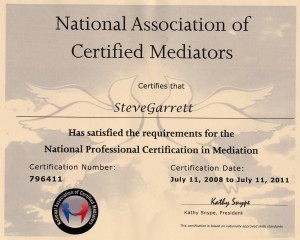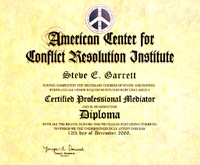Mediator


Steve Garrett as Mediator
Steve Garrett is an enrolled mediator with the Financial Industry Regulatory Authority (FINRA) as a Mediator in disputes involving members of the Financial Industry Regulatory Authority and the public. With more than 25 years of experience in litigation support and testimony in FINRA Arbitrations and Mediations. (FINRA is the successor to the NASD.)
Numerous successful conflicts resolved.

Cost of Mediation
Past District Governor Steve Garrett does not charge for his time as a mediator involving Rotary related conflicts.
The actual cost of meeting space, travel, and other expense will usually be split between the parties.
Note: For non-Rotary mediation, the cost may be comparable to that of an attorney; the mediation process generally takes much less time than moving a case through standard legal channels. While a case in the hands of a lawyer or a court may take months or years to resolve, mediation usually achieves a resolution in a matter of hours. Taking less time means expending less money on hourly fees and costs.
Frequently Asked Questions
How does mediation work?
Mediation is flexible and creative. The process varies from case to case, depending largely on the parties’ needs. Usually, the parties meet to discuss the issues face-to-face. The mediator helps the discussions remain focused and productive. Then, the mediator may hold private caucuses with each party separately and will carry messages, clarifications, questions, proposals, offers, and counteroffers, back and forth between them. The mediator uses the private caucus and other techniques to facilitate the negotiation.
Is a Mediated Solution a Legal Obligation?
Mediation is non-binding. The emphasis is on fashioning a solution satisfactory to all. However, if the parties cannot negotiate an acceptable settlement, they may still benefit from the process by narrowing the issues to be arbitrated or litigated.
What are the Benefits of Mediation?
Control Mediation belongs to the parties. The disputing parties control the process, scheduling, costs, and outcome of the dispute.
Less Adversarial The mediation process is informal. It is less confrontational than arbitration or litigation.
Preserves Options Parties can enter mediation without jeopardizing their option to arbitrate or litigate.
Swift Settlement Most mediations are successfully concluded in a single day. Since mediation can be scheduled soon after a dispute arises, parties reach a settlement much earlier than in arbitration or litigation.
Lower Cost Mediation usually entails lower legal and preparatory costs, minimal interruption of business or personal life, lost productivity is kept to a minimum, and the fees and expenses of mediation are modest.
Preservation of Relationships By reaching an early resolution with minimal financial or other strain on either party, the chances for preserving business relationships are greatly enhanced.
Protects Privacy Mediation offers greater confidentiality than arbitration.
Creative Solutions As a mediator I can help the parties craft creative solutions.
Low Risk Settlement potential is high. The case proceeds quickly. The cost is modest, and there are benefits even if a settlement is not reached.
What if a Settlement is not Reached?
Most parties express satisfaction with the mediation process even when they do not reach a full settlement. The process, at the very least, helps the participants understand the parameters of the conflict. By the end of a single day of mediation, the improved lines of communication often place the parties in a better position to settle the case at a later stage.
